DUBAI // In a small, quiet room in Jumeirah, operators seated in front of computers make quick, firm hand movements signing with video callers.
The Sanad Relay Centre, launched by the Community Development Authority last year, provides interpretation services – from sign language to speech – and advice for Arabic and English sign language users.
From an application that can be downloaded on PCs or smart devices, a service user makes a video call or sends a video message asking for translation assistance or advice from the Sanad Relay staff.
It could be they are asking for an interpreter to have a live video call with their doctor – or they have sent a video detailing what they want to tell the doctor, with the centre sending back a video message with the translation from sign to speech.
“People call if they are with the police, immigration or an ambulance worker calls for help with translation,” said Omer Ibrahim Osman, a sign language interpreter with the CDA.
“Some deaf people call to communicate with their manager at work or to search for a job. We even got a video marketing a clothes store.”
The CDA social workers brought in the UAE Deaf Association to help then understand the obstacles the sign language community faced.
Calls are handled from 7.30am until 2.30pm by three operators, who are also trained to respond to queries on disabilities, or just provide an understanding presence.
“When people call it’s apparent that sometimes they just need someone to have a chat,” said Khaled Al Kamda, CDA’s director general and the inventor of the service.
“It’s important to help this community access the same services we can reach – to have a society without barriers,” Mr Kamda said. “It sometimes feels like a shutdown for them because what we take for granted is not available unless they take someone along. They do not like being dependent.”
The service offers users some relief from reliance on friends or family in carrying out day-to-day activities such as interacting with a government office or staff at a store.
“I use this to communicate inside and outside the office,” signed Hawa Ali, an immigration department executive with hearing loss.
“It should be used by all authorities – police, courts to connect with people like us.”
Part of the next phase of the development of the service is to install the system on tablets, mobiles and computers in government customer service and call centres.
The CDA interpreters are conducting sign language training sessions with government authorities, such as Dubai Municipality, Dubai Ambulance Services and the Roads and Transport Authority. The organisation has also started talks with authorities to make data charges for video conferencing cheaper for the hearing impaired to enable easy access to services.
While the centre serves more than 3,000 deaf and mute people in the UAE, the app – set up in partnership with Microsoft – can be downloaded free from the CDA homepage by anyone across the world.
That meant the centre has also received video call requests for Arabic and English sign to speech translation from countries including Saudi Arabia, India, Pakistan, Sudan and Germany.
Plans to extend the timings of the service and include other languages – sign language differs from country to country, so Spanish, Chinese, British, American sign language is different – have yet to take off as skilled interpreters are scarce and expensive.
However, the centre is ambitious and tenacious. It plans to allow people with sign skills in other languages to register as volunteers and help connect people with hearing loss who speak other languages.
“We want to create a global application to be used in any country, not from this centre, but to connect people all over the world,” Mr Kamda said.
“We want to give this community the freedom to reach out without always having someone with them.”
rtalwar@thenational.ae


